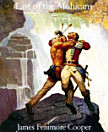The Spy
Sep 2016 · Otbebookpublishing
E-Book
410
Seiten
family_home
Zulässig
info
reportBewertungen und Rezensionen werden nicht geprüft Weitere Informationen
Über dieses E-Book
Autoren-Profil
James Fenimore Cooper (1789-1851) stands as a towering figure in American literature, often hailed as the nation's first major novelist. Born in Burlington, New Jersey, and raised in the frontier town of Cooperstown, New York, Cooper's early life was steeped in the rugged landscapes and pioneering spirit that would later permeate his works. A Yale dropout turned sailor, Cooper's maritime experiences deeply influenced his storytelling.Cooper's literary career began almost by accident; he reportedly claimed he could write a better novel than the one he was reading, leading to his debut, "Precaution," in 1820. However, it was "The Spy" (1821) and "The Pioneers" (1823) that catapulted him to fame. His most enduring legacy lies in the "Leatherstocking Tales," featuring the iconic frontiersman Natty Bumppo, which includes "The Last of the Mohicans" (1826), a staple in American literary canon.A pioneer in the historical novel genre, Cooper's works are celebrated for their vivid depictions of frontier life and complex portrayals of Native American characters, though modern readers often critique his romanticized and sometimes stereotypical representations. His influence extended to contemporaries and successors alike, including Herman Melville and Mark Twain, the latter of whom famously parodied Cooper's style.Cooper was no stranger to controversy; his outspoken political views and critiques of American society often put him at odds with the public and critics. He championed environmental conservation and was an early advocate for preserving America's wilderness, a revolutionary idea in his time.James Fenimore Cooper's blend of adventure, social commentary, and pioneering spirit continues to captivate readers, securing his place as a foundational figure in American literature.
Dieses E-Book bewerten
Deine Meinung ist gefragt!
Informationen zum Lesen
Smartphones und Tablets
Nachdem du die Google Play Bücher App für Android und iPad/iPhone installiert hast, wird diese automatisch mit deinem Konto synchronisiert, sodass du auch unterwegs online und offline lesen kannst.
Laptops und Computer
Im Webbrowser auf deinem Computer kannst du dir Hörbucher anhören, die du bei Google Play gekauft hast.
E-Reader und andere Geräte
Wenn du Bücher auf E-Ink-Geräten lesen möchtest, beispielsweise auf einem Kobo eReader, lade eine Datei herunter und übertrage sie auf dein Gerät. Eine ausführliche Anleitung zum Übertragen der Dateien auf unterstützte E-Reader findest du in der Hilfe.







